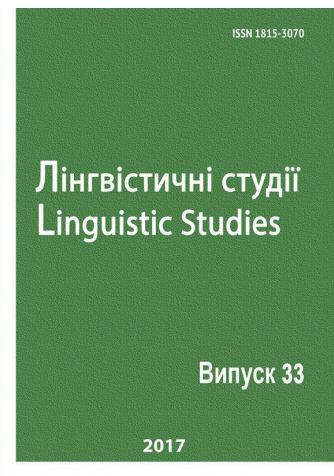У пошуках інтегративного підходу до конструювання авторської ідентичності в науковому дискурс.
Ключові слова:
авторська особистість, саморепрезентація, ставлення, тон, позиціонуванняАнотація
У статті розглянуто stance («позиція», «ставлення») та voice («голос», «тон») як два взаємодоповнюючі теоретичні конструкти для вивчення авторської особистості у науковому дискурсі. Здійснено спробу синтезувати позиційно-центричний підхід К. Гайленда та тоно-центричний підхід Р. Іваніч для якнайповнішого і водночас чітко структурованого аналізу авторської присутності у науковому тексті. Обґрунтовано доцільність розгляду засобів вираження категоричності/некатегоричності (boosting/hedging) у рамках інтерперсонального позиціонування (взаємодії з читачем) замість текстуального позиціонування (ставлення автора до пропозиційної інформації).Посилання
Biber, Douglas, and Edward Finegan. "Styles of stance in English: Lexical and grammatical marking of evidentiality and affect." Text - Interdisciplinary Journal for the Study of Discourse 9.1 (1989): 93-124. Web.
Bucholtz, Mary, and Kira Hall. "Identity and interaction: a sociocultural linguistic approach." Discourse Studies 7.4-5 (2005): 585-614. Web.
Burgess, Amy, and Roz Ivanič. "Writing and Being Written: Issues of Identity Across Timescales." Written Communication 27.2 (2010): 228-55. Web.
Fløttum, Kjersti (2012). “Variation of stance and voice across cultures”. Stance and voice in academic writing. Ed. by Ken Hyland and Carmen Sancho Guinda. London: Palgrave-MacMillan, 2012. 218-231. Print.
Gray, Bethany, and Douglas Biber. “Current Conceptions of Stance”. Stance and voice in academic writing. Ed. by Ken Hyland and Carmen Sancho Guinda. London: Palgrave-MacMillan, 2012. 15-33. Print.
Hyland, Ken, and Feng (Kevin) Jiang. "Change of Attitude? A Diachronic Study of Stance." Written Communication 33.3 (2016): 251-74. Web.
Hyland, Ken. "Boosting, hedging and the negotiation of academic knowledge." Text - Interdisciplinary Journal for the Study of Discourse 18.3 (1998): 349-382. Web.
Hyland, Ken. "Disciplinary voices: Interactions in research writing." English Text Construction 1.1 (2008): 5-22. Web.
Hyland, Ken. "Stance and engagement: a model of interaction in academic discourse." Discourse Studies 7.2 (2005): 173-92. Web.
Ivanič, Roz, and David Camps. "I am how I sound: Voice as self-representation in L2 writing." Journal of Second Language Writing 10.1-2 (2001): 3-33. Web.
Ivanič, Roz. Writing and Identity: The Discoursal Construction of Identity in Academic Writing. Amsterdam: Benjamins, 1998.Print.
Jaffe, Alexandra. “Introduction: The sociolinguistics of stance”. Stance: Sociolinguistic Perspectives. Ed. by Alexandra Jaffe. Oxford: Oxford University Press, 2009. 3-28. Print.
Keisanen, Tiina. “Stancetaking as an interactional activity: Challenging the prior speaker”. Stancetaking in discourse: Subjectivity, evaluation, interaction. Ed. by Robert Englebretson. Amsterdam: Philadelphia, 2007. 253–281. Print.
Kiesling, Scott. “Style as stance: Can stance be the primary explanation for patterns of sociolinguistic variation?”. Stance: Sociolinguistic Perspectives. Ed. by Alexandra Jaffe. Oxford: Oxford University Press, 2009. 171- 194. Print.
Matsuda, Paul Kei. "Identity in Written Discourse." Annual Review of Applied Linguistics 35 (2015): 140-59. Web.
Scherer, Klaus R. "What are emotions? And how can they be measured?" Social Science Information 44.4 (2005): 695-729. Web.
Sheldon, Elena. "From one I to another: Discursive construction of self-representation in English and Castilian Spanish research articles." English for Specific Purposes 28.4 (2009): 251-65. Web.
Sperling, Melanie, and Deborah Appleman. "Voice in the Context of Literacy Studies." Reading Research Quarterly 46.1 (2011): 70-84. Web.
Starfield, Sue, and Louise J. Ravelli. "“The writing of this thesis was a process that I could not explore with the positivistic detachment of the classical sociologist”: Self and structure in New Humanities research theses." Journal of English for Academic Purposes 5.3 (2006): 222-43. Web.
Tang, Ramona, and Suganthi John. "The ‘I’ in identity: Exploring writer identity in student academic writing through the first person pronoun." English for Specific Purposes 18 (1999): 23-39. Web.
Tardy, Christine. “Current Conceptions of Voice”. Stance and voice in academic writing. Ed. by Ken Hyland and Carmen Sancho Guinda. London: Palgrave-MacMillan, 2012. 34-50. Print.
Vassileva, Irena. Who is the author?: A contrastive analysis of authorial presence in English, German, French, Russian and Bulgarian academic discourse. Sankt Augustin: Asgard-Verl., 2000. Print.
Yakhontova, Tatyana. "Cultural and disciplinary variation in academic discourse: The issue of influencing factors." Journal of English for Academic Purposes 5.2 (2006): 153-67. Web.
Yang, Yingli. "Exploring linguistic and cultural variations in the use of hedges in English and Chinese scientific discourse." Journal of Pragmatics 50.1 (2013): 23-36. Web.


